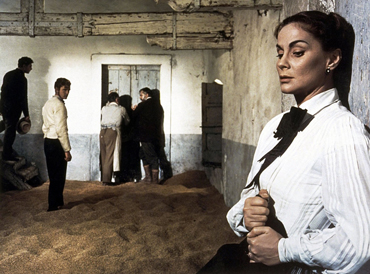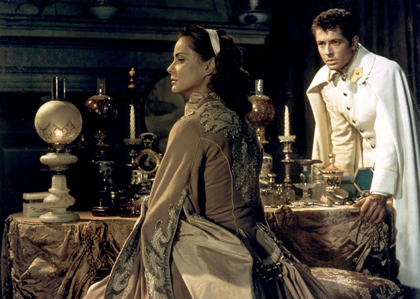
 |
|
|
|
Luchino Visconti carries one of the most intimidating filmographies of any Italian director, and one of the most frustrating. A number of his pictures did not enjoy an American distribution as did the works of Vittorio de Sica and Federico Fellini, instead "premiering" in New York years later in retrospective releases. His wartime Ossessione, a bootleg version of a James M. Cain book, was legally roadblocked. Visconti's epic The Leopard, although bankrolled by 20th Fox, was buried for decades and made available only in wretched dubbed and cut prints. I spent the 1970s looking for Visconti's Bellissima and Sandra (La vaghe stella dell'Orsa) and seem to have missed them entirely. I've only seen Visconti's episode in Le Streghe dubbed into un-subtitled French. His one movie that seemed to play regularly in revival theaters was Rocco and his Brothers. The epic Technicolor romance Senso was an attempt to make an international hit, hiring the then-hot American actor Farley Granger to play opposite the exquisite Alida Valli, the star of the hit The Third Man. The resulting masterpiece wasn't suited to American tastes, being too restrained and too involved with Italian historical issues. Visconti's personal politics may have made his movies a hard sell in the States - he was known as "The Red Count". Senso alters its source story to background Camilo Boito's original story with major events of il Risorgimento, the Italian unification and independence movement of the 1860s. Visconti brings Opera into the movie both literally (an elaborate performance begins the film) and as part of the film's overall style. Pro-independence Venetians pamphlet an audience of Austrian officers at the opera. The fiery revolutionary the Marchese Roberto Ussoni (Massimo Girotti) insults a proud occupying officer, Lieutenant Franz Mahler (Farley Granger). Ussoni's cousin the Contessa Livia Serpieri (Alida Valli) fears for Roberto's life. To protect him, she strikes up a friendship with Mahler, which quickly turns into an extra-marital affair. Livia stays with Franz until the battlefront reaches the Venice-Verona area, whereupon she returns to the country estate of her husband the Count Serpieri (Heinz Moog). Franz risks his life to join her there. He tells her that he doesn't want to fight and needs money to bribe a doctor to certify him as unfit for duty. Making her betrayals complete, Livia gives Franz a fortune that she's holding for the Italian partisans. 
Senso is a refined epic "in depth", in which the personal stories of the main characters never overpower the historical context. The sets, locations and costumes are consistently stunning, and at all times historically accurate. Visconti even had his designers ignore Technicolor's ban on pure whites, because the Austrian uniforms were white. Each different corps has its own specially made vest buttons. Visconti stages a massive opera performance, with galleries of finely dressed patrons; he shows Livia and Franz strolling the back streets and canals of Venice at night and in the early hours of the morning. He also presents several large-scale battle scenes, as Livia's coach cuts through the fighting on her way to rejoin Franz in Austrian-held Venice. Without resorting to giant crane shots, we always feel that life is going on outside the frame in all directions. Crowds and mounted troops aren't used to impress us with the producer's resources, they're just there. Livia roams the entire country villa, and each room has fresh flowers. The images remind us of classical paintings with the aim of immersing us in a bygone world with its own rules. When Luchino Visconti is in this no-limits epic mode, there's nobody like him. Later filmmakers Francis Coppola, Michael Cimino and Sergio Leone sometimes imitate or affect this style, often to impressive effect. But there's nothing like seeing Senso or Visconti's even more sprawling The Leopard. We can tell that these pictures weren't made on anybody's idea of a budget. Senso has movie-star names but it resolutely not a star vehicle. Alida Valli meant nothing to American viewers. Her beauty and glamour are scaled to 1860s values, not the requirements of a 1954 movie marquee. Valli's Livia is unlike, say, Scarlett O'Hara, in that little attempt is made to excuse her behavior. Always at the mercy of her selfish passions, Livia does not feel the patriotic fervor that's in the air. She betrays the trust of her husband and her cousin out of her obsession for the Austrian Franz. As it turns out, the model officer Franz is a faker as well. He has Roberto arrested to avoid a duel of honor. He only joined the army to partake of the pleasures and privileges afforded a fancy uniform. He betrays Livia and sees nothing wrong with taking her money on false pretenses. In other words, Visconti and his main writer Suso Checchi D'Amico's selfish lovers do their best to ignore the world-changing events taking place around them - they really have no interest beyond their own desires. Alida Valli makes Livia a fascinating woman -- no wilting violet but a reckless lover willing to risk anything. For once Valli's formality and icy demeanor (which was such a turn-off in Hitchcock's The Paradine Case) is an asset. When Livia walks proudly through the trash-strewn streets, we know she's a noblewoman protected by her social position. Farley Granger made his name in movies playing confused young guys in need of love and understanding; before Senso he was also acceptable as Hitchcock's somewhat morally tainted social climber in Strangers on a Train. When Granger enters Senso he's an entirely new character, a rigid, vain showcase soldier with a sharp profile and an eye for the ladies. Livia's apparently looking for just such a fantasy, and Franz supplies it in spades. We see through this fraud long before she does ... even Franz's bunkmates know how sordid their affair is. What other kind of woman stoops to seeking out a soldier in his barracks, repeatedly? Senso is instructive in that it shows Livia's rank as a Contessa is not some kind of instant social force. She can behave in most any way she desires, and nobody will call her on it. Livia doesn't seem to have any close friends. Her cousin's associate Luca (Sergio Fantoni) trusts her implicitly. Livia's servant knows the score and does her best to protect her mistress; but even she isn't above stealing spilled gold pieces when Livia goes off the deep end. 
Visconti also refuses to overload the conclusion with romantic clichés that give his lovers the chance to repent or atone for their crimes of the heart. The pair acts true to their character, eventually throwing their own self-interest aside as well. The payoff is madness and death in no uncertain terms. It's a director's triumph and the kind of movie that lasts in the memory, even if we can see why it wouldn't galvanize a standard audience. Livia doesn't pick up a handful of Verona dirt and make grandstanding speeches about Tomorrow being Another Day, as the orchestra cues the main theme. If Visconti had his way the movie would have ended before its memorable last scene. He was forced to add it only after main photography had wrapped; because Farley Granger had already returned to America, his part was played by a double. Senso wasn't considered a success, especially not for Ms. Valli, who disappeared from screens for three years, returning to play mostly character support roles. Farley Granger's career soon shifted to mostly TV work. Luchino Visconti was always busy directing opera, but he didn't release another feature for three years as well. The legacy of Senso has suffered for lack of really good prints. It was cut and dubbed for English language use, with Tennessee Williams contributing to the English dub dialogue. But in the United States the movie remained almost unknown. DVD Blu-ray of Senso will help resurrect Luchino Visconti's masterpiece from undeserved obscurity. Originally filmed in three-strip Technicolor, it has a look quite unlike some of the variable color pictures made in Italy around this time, lush but never decorative for its own sake. Many of Livia's costumes are subdued in color, and the overall design schemes don't splash color around for its own sake. Venice at dawn and those sumptuous villa interiors are impressive, but they also look real: the heightened vibrancy of Technicolor (not to mention the higher resolution of HD) make us aware of the textures of luxury -- glass table tops, polished metal and marble, rugs and tapestries, old paintings on the walls. The Italian-sourced restoration of the film is remarkable, especially if one's only exposure to Senso has been through poor 16mm prints. Cameraman Giuseppe Rotunno is listed as a consultant on the disc's transfer. With no composer listed, the soundtrack music is presumably from various operas of the period. 1 The Italian track is very well managed, with Farley Granger's voice expertly dubbed. We're told that in some scenes, more than one language was spoken on the set. This Blu-ray (and 2-disc DVD release) contains a second entire version of the movie, the English-language version with the title The Wanton Countess. We can now all hear the Tennessee Williams dialogue for ourselves. Criterion's prime-source extras will delight students of Visconti. The main documentary includes input from Giuseppe Rotunno, Francesco Rosi, Piero Tosi and the screenwriter's daughter Caterina D'Amico. Another docu relates Visconti and Senso to Visconti's family background in opera. We're told that at his childhood dinner table, Visconti's father announced the beginning of the meal with the phrase, "The curtain rises!" Peter Cowie contributes a visual observance on the movie and a 1966 BBC docu summarizes Visconti's contributions to movies, the theater and opera. The fat insert booklet has a lengthy essay by Mark Rappaport and an excerpt from Farley Granger's autobiography.
On a scale of Excellent, Good, Fair, and Poor,
Senso Blu-ray rates:
Footnote: 1. A note from Gordon Thomas, 2.28.11: Hi Glenn, Reading your excellent writeup of Senso, I came upon your remark that the music after the film's opening sequence of Il Trovatore was presumably opera. I find it interesting that Visconti not only didn't use Italian operatic music for his underscore, he used symphonic music by an Austrian composer, Anton Bruckner, from his Symphony no. 7. Not only that, but he used music only from its second movement, Andante: Sehr feierlich und sehr langsam. Of course Granger's character is Austrian, but I'm sure Visconti chose the Bruckner more because it has to be some of most dolorous music ever written, perfect for Livia's fall. And I would have to disagree that Livia is totally self-involved and a-political. At the beginning of the film, she is very much a Risorgimento patriot and in cahoots with her nationalist cousin, which is why her giving away the cache of valuables--marked for financing the revolution and placed in her hands for safekeeping--to con artist Franz is the act upon which Livia's tragedy (and madness) turns.
I'm puzzled over why the Criterion's documentary on the music in Senso doesn't mention the Bruckner underscore. True enough, the Il Trovatore excerpts are more symbolic, but his choice of the slow movement is very deliberate as well. I'll definitely be mentioning it in my review in May's issue of Bright Lights. Regards,
Gordon
Reviews on the Savant main site have additional credits information and are often updated and annotated with reader input and graphics. Also, don't forget the 2010 Savant Wish List. T'was Ever Thus.
Review Staff | About DVD Talk | Newsletter Subscribe | Join DVD Talk Forum |
| ||||||||||||||||||